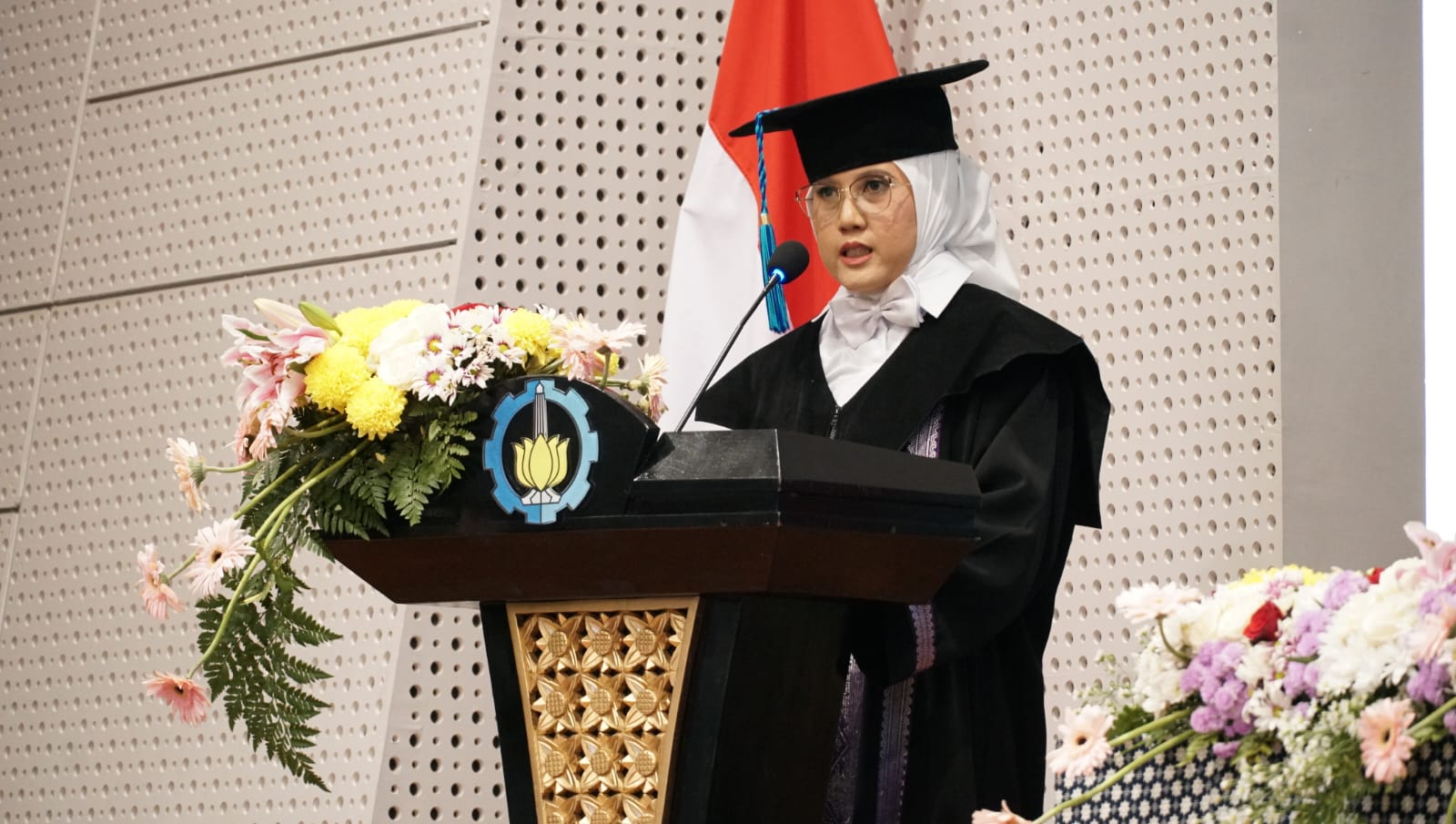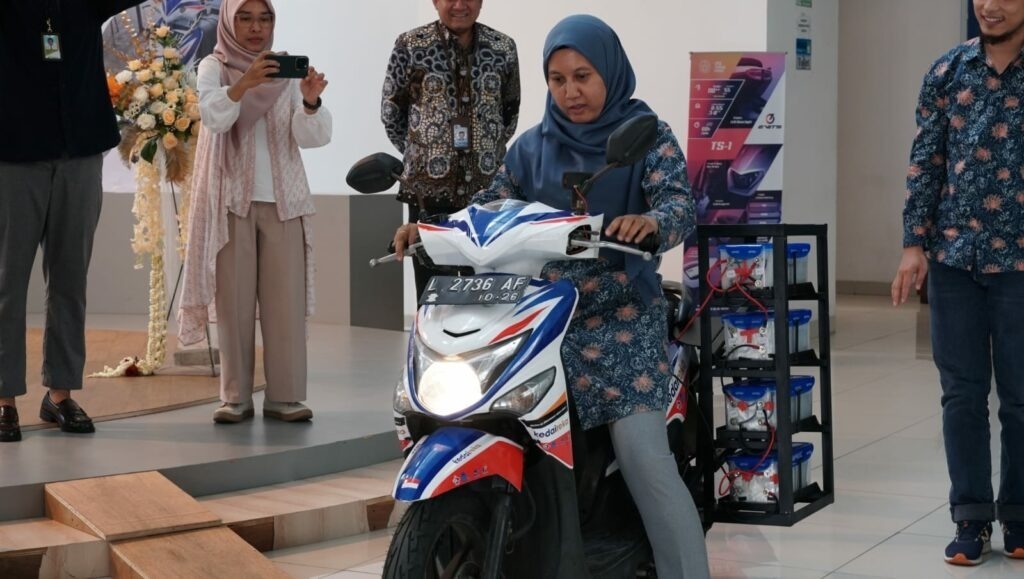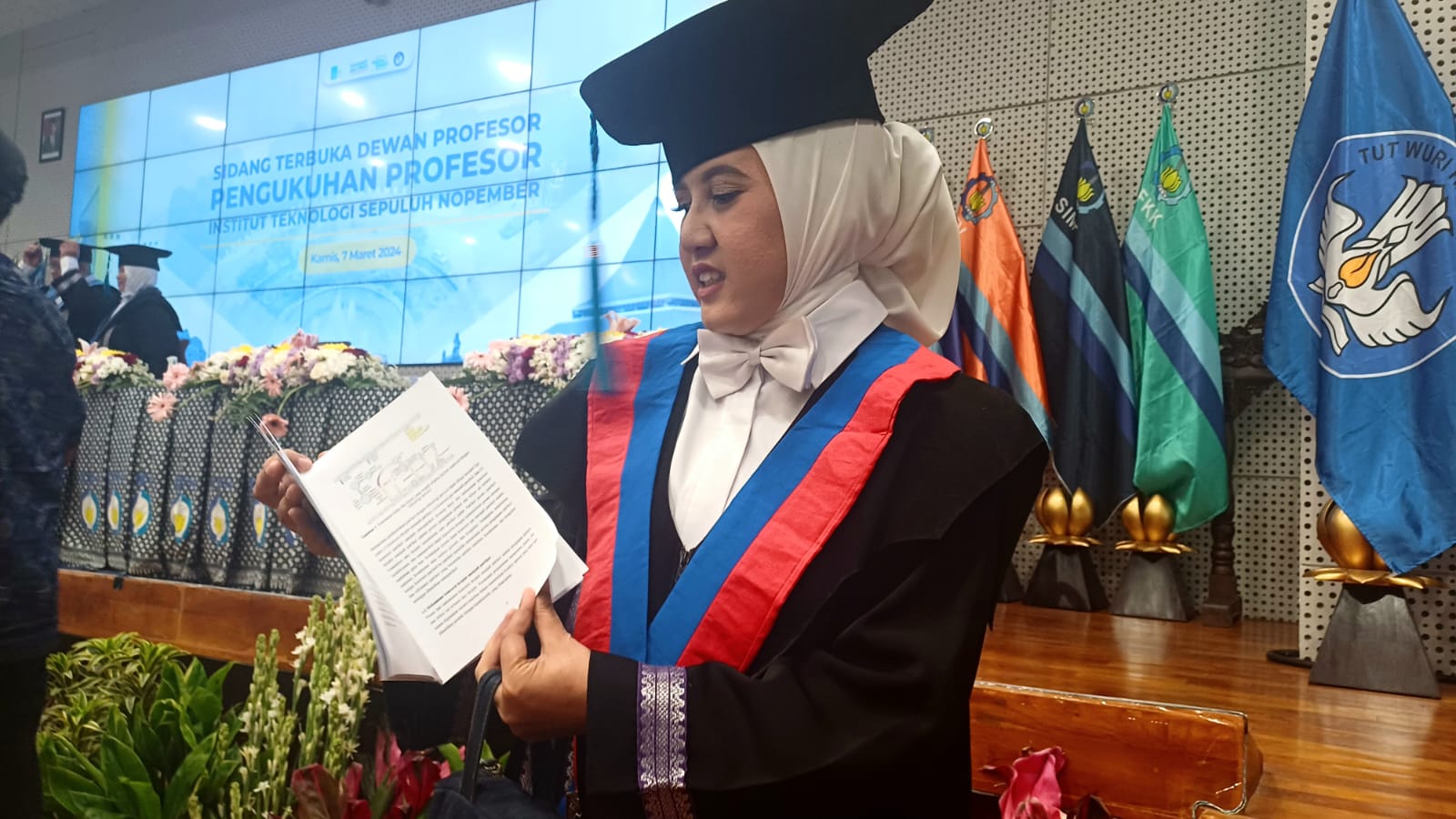Supporting the Development of Material Processes, ITS Professors Utilize Biomass Waste

Prof Dr Eng Widyastuti ST MT, when presenting his scientific oration at the Open Session of the ITS Professor Inauguration Council of Professors
ITS Campus, ITS News — Innovation in material processes continues to develop to support society’s need for environmentally friendly technology. Highlighting this, the 200th Professor of Institut Teknologi Sepuluh Nopember (ITS), Prof Dr Eng Widiyastuti ST MT, utilized aerosol technology and material processes to convert biomass waste into functional products.
The woman, who is familiarly called Widi, explained that the development of material products is being challenged due to the increasingly limited availability of natural resources. She says efficiency in extracting raw materials, processing, and making final products must be maximized. “The point is how to increase the added value of products with materials that are easy to obtain,” explained Widi.
Based on this, the Professor from the ITS Chemical Engineering Department utilized the abundant biomass waste around her to create products that can be applied to food, energy, and health. Using avocado seeds as sample material, Widi applies aerosol technology to optimize product usability.
This woman from Surabaya microencapsulated avocado seed extract in powder form in the food sector. Avocado seeds, which are rich in antioxidants, are susceptible to oxidation and sensitive to heat and light. Therefore, Widi applied a spray drying process to cover the avocado seed extract with a polymer matrix as a core coating to protect the compounds inside.

Prof Dr Widyastuti ST MT testing the ITS Al-Udara Battery generation I prototype
This woman, who also serves as the Head of the ITS Chemical Engineering Department, is also part of the team that developed the ITS Al-Udara Battery Generation I. The remaining material from the extraction of avocado seeds is used for the electrocatalyst process in aluminum-air batteries. “Because it still contains cellulose, we can still use avocado seed waste,” she said.
Furthermore, Widi explained that the material process used is carbonization, namely heating the material in a hydrothermal reactor at 200 Celsius for 12 hours. From this process, avocado seed waste produces a type of carbon that has good characteristics as an electrocatalyst. Electrocatalyst work tests show that the oxygen reduction reaction with aluminum produces sufficient current to supply battery power.
Highlighting performance advantages, ITS Al-Udara Batteries are used as the main energy source for electric vehicles. Metal air batteries are considered cheaper, lighter, environmentally friendly, have a relatively higher energy density, and have better safety factors than conventional batteries. “We hope to develop a type of secondary battery whose power can be recharged,” said Widi.

Prof Dr Eng Widiyastuti ST MT explaining the results of her research in a scientific oration book entitled Inovasi Proses Material Untuk Kemajuan Indonesia (English: Material Process Innovation for the Progress of Indonesia)
Widi added that the research she carried out also developed seawater aluminum batteries. Taking advantage of Indonesia’s potential as a maritime country, the battery is activated by seawater, which functions as an electrolyte. The battery developed is environmentally friendly and suitable for application in underdeveloped, frontier, and outermost coastal areas (in Indonesian known as 3T; Tertinggal, Terdepan, Terluar).
Expanding upon the utilization of avocado seed waste, further innovation was carried out in manufacturing medical devices in the form of wound dressings. Residues from avocado seeds, which still contain cellulose, can help wound healing. By adding gelatin and citric acid, the material is molded to form a wound dressing product that is considered effective after the antibacterial test analysis process.
Through innovations in aerosol science and material processing, Widi hopes Indonesia can be independent regarding health, energy, and food. Carrying the concept of sustainable development, the community can utilize biomass waste around them to meet their needs. “By being independent, Indonesia can become strong,” she concluded. (ITS Public Relations)
Reporter: A Rifda Yuni Artika
Translator: Lael Alphenos Soebakir
Related News
-
ITS Sends Off 12 Free Mudik Vehicles Ahead of Eid Al-Fitr
The dispatch of 11 bus fleets carrying ITS students for the Free Mudik ITS 2024 ITS Campus, ITS News
April 05, 2024 07:04 -
ITS Lecturer Wins 2024 Female Science Talents Intensive Tracks from Germany
Sri Fatmawati SSi MSc PhD, a lecturer at the Department of Chemistry, ITS, has emerged as the winner of
April 05, 2024 07:04 -
ITS Shares Tips & Tricks on SNBT 2024 Socialization
(from left) Executive Secretary of SNPMB 2024, Bekti Cahyo Hidayanto SSi MKom, Head of the Admissions Subdirectorate at ITS,
April 05, 2024 07:04 -
Supporting Defense in Indonesia, ITS Professor Creates Anti-Radar Material
Professor Dr. Mashuri SSi MSi, while delivering his academic oration on anti-radar materials during the ITS Professorial Inauguration. ITS
April 05, 2024 07:04
